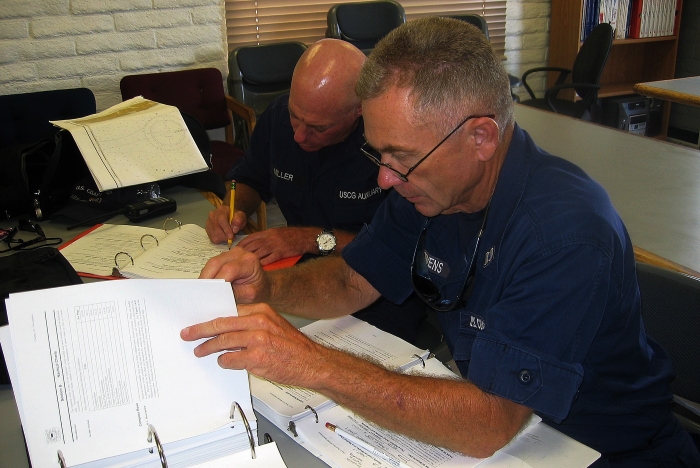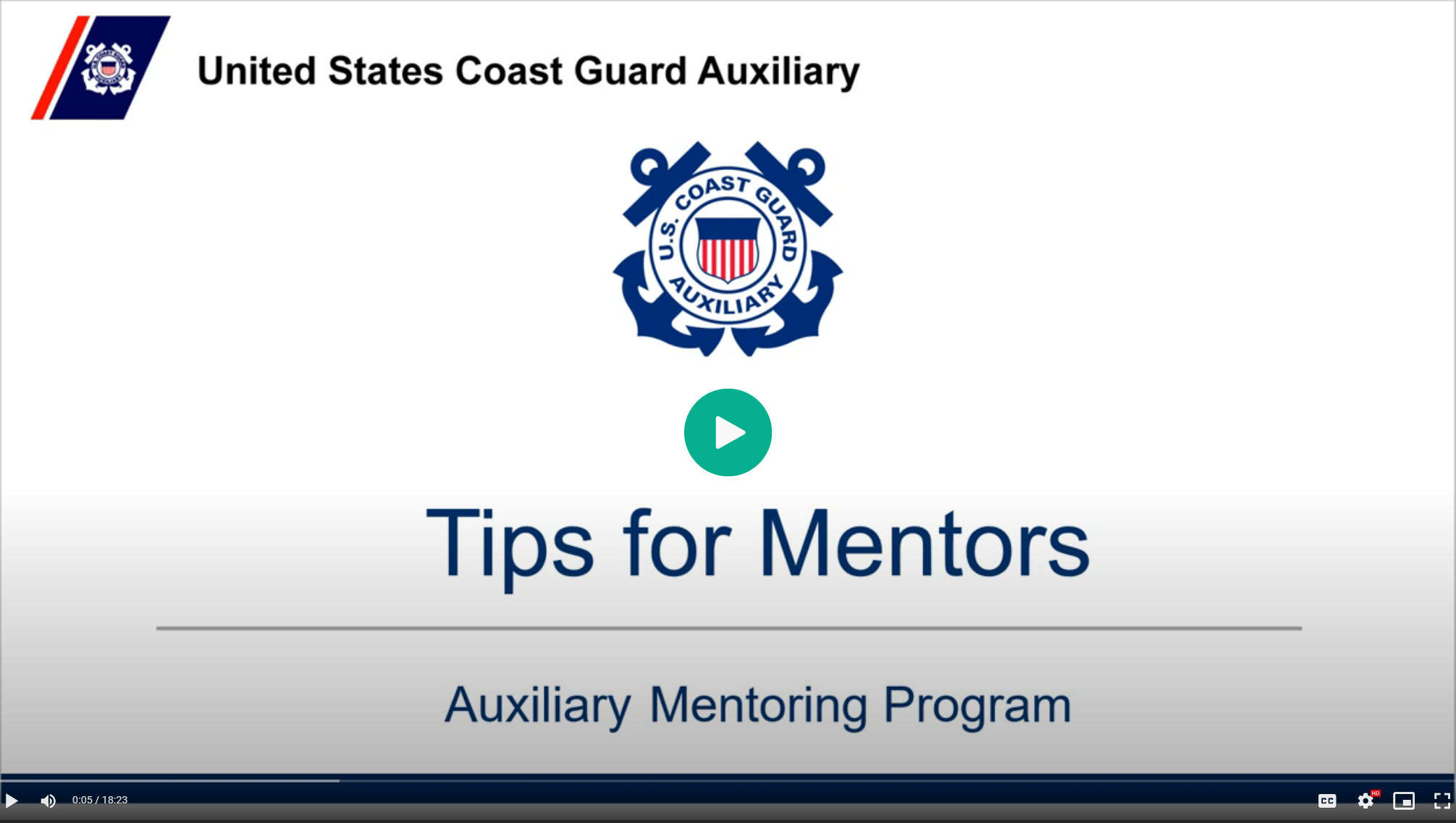Return to T-Directorate's Home Page.

Pass the Torch: Be the Mentor You Once Needed
Are you an experienced Auxiliarist ready to make a lasting impact? Explore the Auxiliary Mentorship Guide (click here) and the insights on this page to learn how to build a strong, effective mentoring relationship tailored to you and your mentee. You'll gain essential tools to share your knowledge, inspire growth, and lead with purpose.
Your Role as a Mentor
A mentor is someone who shares wisdom and personal experience to help others grow professionally. Drawing from deep and diverse Auxiliary backgrounds, mentors embody a culture of learning and integrity. They uphold high ethical standards of respect, trust, and confidentiality.
- Mentors serve as champions for their mentees by embracing four key roles:
- Teacher – Helps mentees assess their goals and create practical plans to achieve them.
- Guide – Offers perspective on the Auxiliary’s structure and culture, supports strategic networking, and helps navigate complex environments.
- Counselor – Encourages self-discovery and independent thinking. Rather than solving problems, a mentor empowers the mentee to build confidence and trust in their own judgment.
- Challenger – Delivers constructive feedback on strengths and growth areas. A mentor helps the mentee understand how their behaviors affect others and guides them in taking targeted steps toward greater effectiveness and professional readiness.
As a mentor, it’s natural to want to solve your mentee’s problems—but your proper role is to guide them to reach their own solutions. Do this by asking open-ended, thought-provoking questions that encourage reflection and growth.
These questions should help your mentee:
- Reveal new insights about themselves
- Clarify their goals and aspirations
- Explore emotions tied to specific situations
- Identify problems and brainstorm solutions
- Assess their commitment to personal development
Exploratory questions - Assess the real issues and gain a greater understanding:
- What are the most interesting aspects of your Auxiliary 'job'?
- Why did you pick this to concentrate on?
- What do you want to gain?
- What do you want to be known for?
- What tells you that your assessment is correct? What are other people’s perceptions of this issue?
- What assumptions are you making here?
- What other ideas do you have?
- How long has this been an issue?
- What did you learn from past experiences that you didn’t expect to learn?
- What are the reasons behind an issue?
- Have you tried to resolve this issue before? Why or why not? If yes, what was the result?
- What choices do you have?
- What progress have you made?
- What other ideas do you have?
- How are you using the things/ideas we’ve spoken about?
- What results are you looking for?
Empowering questions - Assist your Mentee to think for themselves:
- What are the skills you want to develop?
- What strategies come to mind when looking at " a situation?
- What do you see as possible solutions here?
- What outcomes are you after here? Are these outcomes reasonable given the circumstances?
- What resources are available to help you move forward?
- What key players do you need help from?
- What other information do you need to arrive at a solution?
- What forces may help and/or hinder you?
- What are the pros and cons of each solution?
- What is the first step you need to take to achieve your preferred outcome?
- What alternative strategies should you develop?
- How will you know you have mastered or successfully enhanced a competency?
- How will you apply your new skill?
Remember to listen. Ask more questions and give fewer answers to understand their responses. Paraphrase and confirm their answers to ensure you have accurately understood their response.
Mentoring Roles and Responsibilities
Mentors should:
- Support the mentee's development of professional and interpersonal competencies through strategic questioning, goal setting, and planning
- Create a supportive and trusting environment
- Agree to and schedule uninterrupted time with your mentee
- Stay accessible, committed, and engaged during the length of the program
- Actively listen and question
- Give feedback to the mentee on his/her goals, situations, plans, and ideas
- Encourage the mentee by giving them genuine positive reinforcement
- Serve as a positive role model
- Provide corrective feedback when necessary
- Openly and honestly share "lessons learned: from your own experiences"
- Respect your mentee's time and resources
- Participate in the scheduled events for the program
- Seek assistance or guidance if questions arise that you are not able to answer
Why Mentor?
Mentors gain deeper insight into the organization, expand their professional network, and find personal satisfaction by guiding others. The experience offers an opportunity to reflect on past challenges and achievements, reinforcing lessons learned. By sharing their expertise, mentors leave a lasting legacy and help shape the future of the Auxiliary.
Benefits include:
- Personal fulfillment through supporting professional growth
- Learning from your mentee’s fresh perspectives
- Building meaningful new relationships
- Enhancing “teacher” skills by clarifying career goals
- Strengthening “guide” skills by navigating Auxiliary pathways
- Developing “advisor” skills by identifying strengths and areas for growth
- Earning recognition for your contribution
If your mentee is looking for growth opportunities:
Shadowing Events - You can offer shadowing experiences and opportunities to your mentee by taking them to meetings with you and including them in other relevant opportunities whenever possible. By sharing your experiences and incorporating them into your everyday work, you will allow your mentee to observe how you demonstrate your strong competencies.
Work Sharing - Please look for or design learning assignments that allow the mentee to assist you with projects for your office or role, helping them understand your contribution to the Auxiliary better. The Auxiliary offers more formalized training, such as:
- Auxiliary Search Coordination and Execution Specialty Course (AUXSC&E)
- Auxiliary Navigation Specialty Course (AUXACN)
- Introduction to Marine Safety
- Auxiliary Patrol Specialty Course (AUXPAT)
- Auxiliary Aids-to-Navigation (ATON) and Chart Updating C-school (AUX-06)
- Auxiliary Air Coordinator C-school (AUX-15)
Hands-on Training - Find opportunities to share specific knowledge and introduce your mentee to new work within the Auxiliary. The Training Directorate offers more formalized training, such as:
- Auxiliary Weather Specialty Course (AUXWEA)
- Auxiliary Seamanship Specialty Course (AUXSEA)
- Auxiliary Communications Specialty Course (AUXCOM)
- Auxiliary Flotilla Leadership Course (AFLC)
- Auxiliary Leadership and Management School (AUXLAMS)
- Auxiliary Mid-Level Officer Course (AMLOC)
- Auxiliary Upper-Level Officer Course (AULOC)
- Auxiliary Senior Officer Course (ASOC)
Make introductions -Create opportunities to connect your mentee with influential members and broader networks within the Auxiliary. These introductions can expand their perspective and strengthen their sense of belonging.
Listen more, speak less - Prioritize listening over offering solutions. Use open-ended questions and active listening to gain deeper insight into your mentee’s goals and help them find their own path forward.
